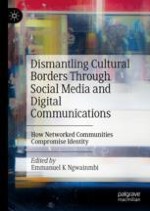2022 | OriginalPaper | Chapter
11. Identity Negotiation and Cosmopolitanism in Social Media: The Case of London and Sao Paulo Migrant Communities
Author : Viviane Riegel
Published in: Dismantling Cultural Borders Through Social Media and Digital Communications
Publisher: Springer International Publishing
Activate our intelligent search to find suitable subject content or patents.
Select sections of text to find matching patents with Artificial Intelligence. powered by
Select sections of text to find additional relevant content using AI-assisted search. powered by
